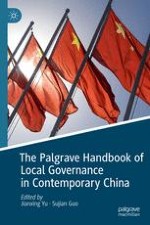2019 | OriginalPaper | Buchkapitel
15. The Changing Institutional Space Regarding Roles and Behavior of Village Leaders: An Evolution from Villagers’ Autonomy to the Power List
verfasst von : Yuejin Jing, Lina Zhang
Erschienen in: The Palgrave Handbook of Local Governance in Contemporary China
Verlag: Springer Nature Singapore
Aktivieren Sie unsere intelligente Suche, um passende Fachinhalte oder Patente zu finden.
Wählen Sie Textabschnitte aus um mit Künstlicher Intelligenz passenden Patente zu finden. powered by
Markieren Sie Textabschnitte, um KI-gestützt weitere passende Inhalte zu finden. powered by
